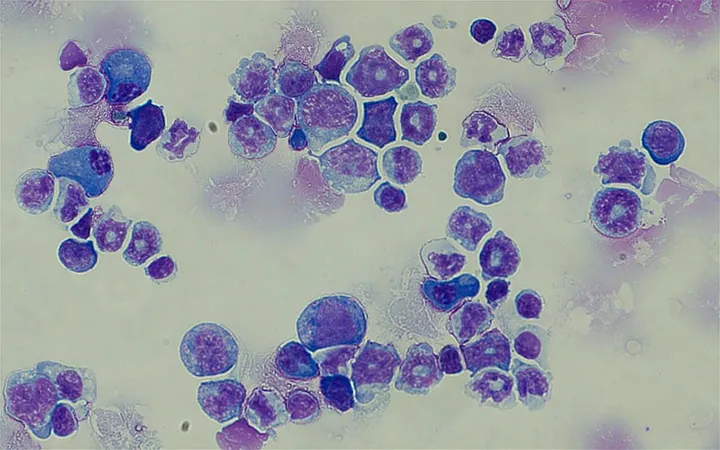
Breakthrough in Leukemia Treatment: Could Blocking a Key Protein Save Lives?
2024-11-07
Author: Arjun
Breakthrough in Leukemia Treatment: Could Blocking a Key Protein Save Lives?
Scientists from Duke-NUS Medical School and their partners have made an important discovery that may revolutionize the treatment of chronic myeloid leukemia (CML), particularly among East Asian patients. Their research uncovered an inherited genetic variation that contributes to drug resistance, leading to aggressive cancer growth in these patients.
Understanding Chronic Myeloid Leukemia (CML)
CML, a form of blood cancer, accounted for a notable 2.5% of all new cancer cases in 2020 and 3.1% of cancer deaths globally. The researchers noted that approximately 12 to 15% of East Asians, including individuals of Chinese, Japanese, and Korean descent, carry a genetic variant in a protein known as the BCL-2 interacting death mediator (BIM). This protein plays a crucial role in regulating cell death, which is vital in treatments aimed at destroying tumor cells.
The Role of the BIM Variant in Drug Resistance
In their groundbreaking study published in the journal Leukemia, the team detailed how the BIM variant allows cancer cells to produce alternative versions of the BIM protein. This results in the cells evading programmed cell death, meaning they survive longer and proliferate more aggressively, thereby worsening the disease.
Current Treatments and Their Limitations
One of the standard treatments for CML involves tyrosine kinase inhibitors, such as imatinib. However, the research showed that leukemia cells with the BIM variation often remain unaffected by imatinib, leading to treatment failure. Dr. Giselle Nah, first author of the study, emphasized that these resistant cells had a significantly higher survival rate compared to those without the BIM variation, allowing the leukemia to progress unchecked.
Innovative Combination Treatment Strategies
To address this challenge, the researchers explored a targeted approach by inhibiting the action of a protein called MCL-1, which plays a crucial role in the survival of leukemia cells with the BIM variant. Their experiments revealed that targeting MCL-1, either alone or in combination with imatinib, can substantially enhance treatment efficacy, opening new avenues for precision therapy in resistant leukemia cases.
Future Implications of the Research
Professor Ong Sin Tiong, senior author of the study, explained that their combination treatment strategy showed promising results, indicating that effectively targeting MCL-1 could potentially mitigate the resistance seen in CML patients with the BIM genetic variation.
Broader Impact on Cancer Treatment
The implications of this research extend beyond just leukemia. With plans for further studies, the findings could also influence treatment strategies for other cancers, such as specific lung cancers, which similarly depend on the BIM protein for tumor suppression.
A Hopeful Future for Precision Medicine
As the researchers continue their efforts, they hope that this discovery will lead to genetic testing becoming routinely incorporated into CML diagnosis protocols, helping tailor treatments to individual patients and significantly improving survival rates. In a world where precision medicine is gaining momentum, this research represents a beacon of hope for countless patients battling drug-resistant cancers, potentially transforming the standard of care and enhancing patient outcomes.


 Brasil (PT)
Brasil (PT)
 Canada (EN)
Canada (EN)
 Chile (ES)
Chile (ES)
 Česko (CS)
Česko (CS)
 대한민국 (KO)
대한민국 (KO)
 España (ES)
España (ES)
 France (FR)
France (FR)
 Hong Kong (EN)
Hong Kong (EN)
 Italia (IT)
Italia (IT)
 日本 (JA)
日本 (JA)
 Magyarország (HU)
Magyarország (HU)
 Norge (NO)
Norge (NO)
 Polska (PL)
Polska (PL)
 Schweiz (DE)
Schweiz (DE)
 Singapore (EN)
Singapore (EN)
 Sverige (SV)
Sverige (SV)
 Suomi (FI)
Suomi (FI)
 Türkiye (TR)
Türkiye (TR)
 الإمارات العربية المتحدة (AR)
الإمارات العربية المتحدة (AR)